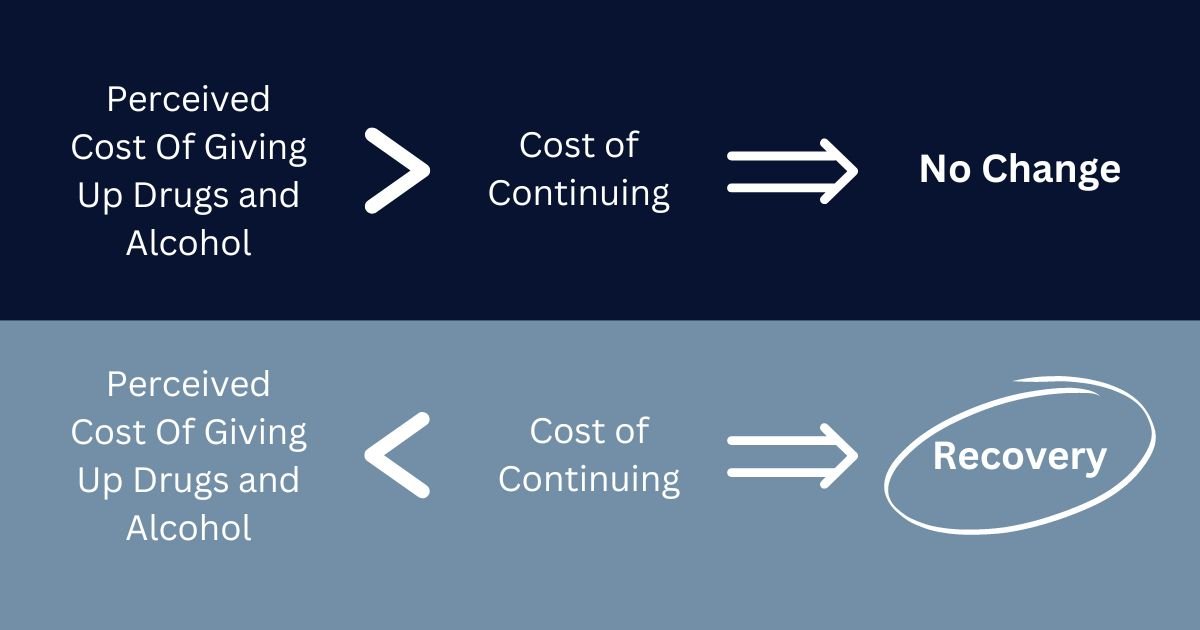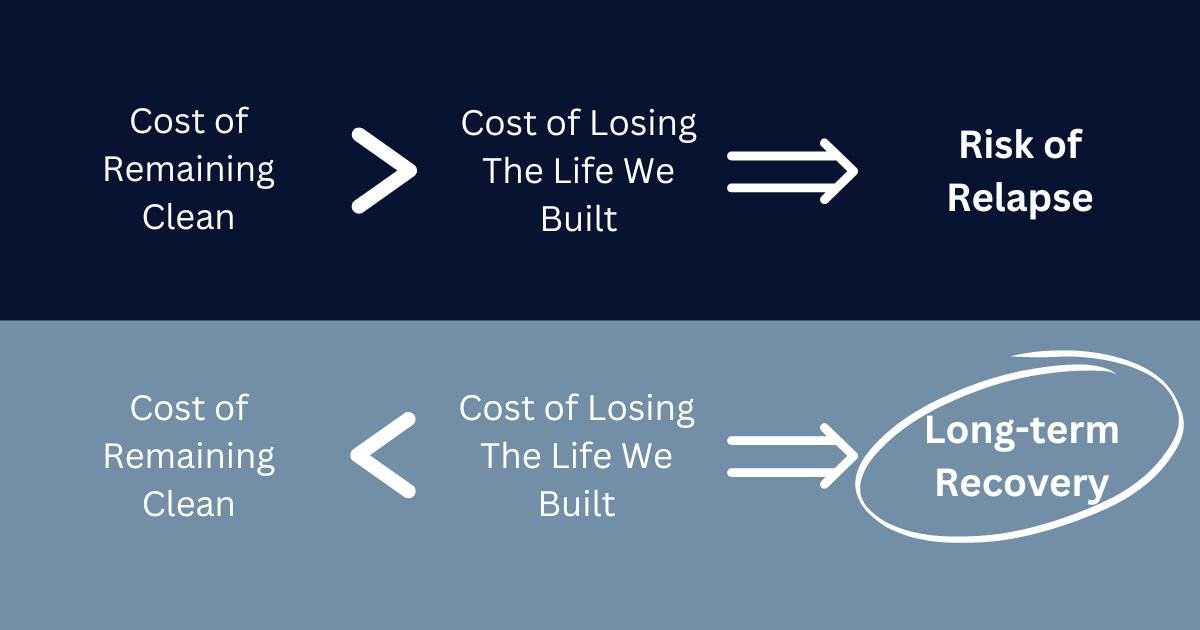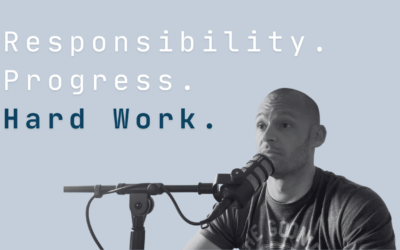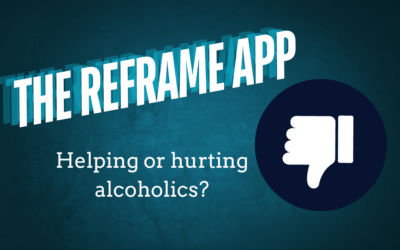Why we do the things we do – this is possibly the greatest predictor of our success or failure in all our endeavors.
Many times we don’t question our reasons for doing X or doing Y, they’ve become habitual and compulsive actions, but nonetheless a reason we do them still exists. Other times, having a clearly defined reason that motivates our behavior is essential to the process. This is certainly the case with recovery.
Choosing to give up drugs and alcohol for good, especially when our lives have come to revolve around them, is an incredibly tough decision to make. Many of us tried to do everything conceivable to manage our use and minimize the negative effects on our lives before finally recognizing that abstinence was the only way.
It is crucial that we recognize our reason for first getting clean and sober. It is then necessary that throughout recovery we develop a reason for staying that way. As we shall see, these are often very different, albeit equally important.
Why We Get Clean
Why a person decides to get clean in the first place varies greatly. Usually though, it comes down to cost – the cost of continuing to drink or do drugs becomes too great for the person to bear. This could be financial costs, health costs, family costs, or a cost in morals and values. Whatever the case, this cost became a reason for them to change — their why.
We often hear the term ‘rock bottom’ thrown around and are told that a person has to hit rock bottom before they truly commit to recovery. The problem with this analogy is that everyone has a different rock bottom and different circumstances that lead to them deciding to quit. Some people decide to quit after a medical scare, some people after losing their family and friends, and others after almost losing a job or having a child. Since everyone has a different rock bottom, the term doesn’t really mean anything concretely.
Because of this, I think a much better way to view the issue is through the cost equation. As I previously mentioned, any person who has a problem with drugs and alcohol begins to accrue costs associated with continuing their habit. If there were no costs, it wouldn’t be a problem to begin with. While initially these costs might be invisible to him or her, eventually they will become great enough where they can not be ignored. The problem is, an addicted mind will continue to repeat these behaviors despite obvious negative consequences. The reason for this is simple, it perceives the cost of giving up drugs and alcohol for good as greater than the cost of continuing. Whether or not this is true doesn’t matter in the slightest, it’s the perception that counts.
When this equation changes in a person’s mind and they realize that the cost of them continuing to abuse drugs and alcohol is greater than the cost of them giving it up, this is usually when that person will decide to make the change. This switch can come from a major life event or simply a moment of clarity.

Getting Clean For Someone Else
You’ve likely heard that ‘you can’t get clean for someone else, you have to get clean for yourself.’ While this statement is rooted in some truth, it doesn’t tell the whole story and gets the wrong message across. Quite often, people decide to get clean and sober for someone else without initially wanting it for themselves.
People frequently go to rehab, detoxes, or start 12-step programs in an attempt to get clean for their children, their spouses, or their parents. In fact, doing it for themselves can be unimaginable since they don’t value themselves enough to realize that they deserve a better life. But for the ones they love and care about, for someone else, they are willing to give it a shot. There is nothing wrong with this and I don’t believe we should be discounting peoples’ ability to get clean with someone else in mind. Instead, it’s more beneficial to warn of the pitfalls of getting clean for someone else and give people tools and strategies for dealing with it.
The Pitfall of Getting Clean For Someone Else
While it is quite common for people’s initial reason for getting clean and sober to involve the wellbeing of another and while this can be an extremely powerful motivator, there are real risks involved with this method.
One such risk is having your recovery entirely dependent upon another. If this is the case the question becomes – what happens if this person is no longer in your life? Does your recovery fall apart? Do you end up going back to your same old patterns and behaviors?
Sadly, there is a high likelihood of relapse if we view our recovery in a way that is entirely dependent upon someone else. We have little to no control over other people and thus have little to no control over our sobriety when tying it to someone other than ourselves. Sometimes people leave, sometimes people betray us, and sometimes people die.
But there is a way to manage this risk by reframing our reason for getting clean into something sturdier and less dependent upon others.
Reframing Our Why
Many circumstances involving other people might push a person to change their lives and enter recovery. The fear of having a spouse leave them, the fear of being a bad parent, or watching the toll their addiction is having on the people who care about them are all examples of powerful motivators that can make a person finally decide to give drugs and alcohol up for good.
At first glance, it might seem like the person is deciding to get clean in order to benefit another person whether that be their parents, friends, spouse, or child. If we reframe this though, it is possible to make it less about them and more about us. Here I will outline the process and then follow it up with an example so it makes more sense.
The Process
1. Identify what they want for the other person that they currently do not have?
Do they want them to feel safe? Do they want them to stop worrying? Do they want them to grow up with the guidance of a good parental figure?
2. Determine what qualities or characteristics they themselves would have to possess, that they don’t already possess, that would make this a reality?
Do they need to be more dependable? Do they need to be more financially responsible? Do they need to behave more consistently?
3. Determine whether or not these qualities are something they would want for themselves.
4. Determine whether or not quitting drugs and alcohol for good would help them attain these qualities.
A Hypothetical Example
Say a husband in active addiction has a spouse they are continuously hurting. Their wife has begged them to get clean for years now, with little success. Eventually the pain they were putting them through became so obvious and so great they decided to give sobriety a chance. They don’t want to use anymore so that they can stop hurting their wife.
Initially we can see this as a person getting clean so that their spouse has a good husband and no longer has to worry about them. But if we reframe this using the process outlined above, and look at it from a different perspective, the situation changes.
The first question is, what do they want for their wife that the wife is currently struggling with? We answered this above – the man wants his wife to have a good husband and to stop hurting her with his substance abuse.
The second question is, what qualities does this man have to possess in order to be a good husband to his wife that he is currently lacking? He might find he needs to be loyal, responsible, honest, and dependable. He possesses none of these qualities while in active addiction, but that doesn’t mean he can’t be that type of person.
The third question is, does he want these qualities for himself? Would things be better if he were dependable, honest, and loyal? If the answer is yes, then he has reframed his initial desire for someone else into a desire for himself.
The fourth question is, would giving up drugs and alcohol for good and entering recovery increase his chances in becoming the person he wants to be? If the answer is yes, he now has a clearly defined reason he wants to quit for himself.
The Benefits of This Exercise
This simple method of reframing the problem bypasses whether or not the individual thinks they are currently worth getting clean and sober by instead focusing on the person they could become. It also takes the entire dependency of their recovery on another person away, since changing and attaining those characteristics would be a benefit to them no matter who they have or do not have in their lives.
The core of this is that it takes our initial ‘reason’ for getting clean and forces us to ask, what do we really want? When finally deciding to give up drugs and alcohol we wanted to change, we wanted to improve, and we wanted to do this for ourselves and everyone else around us. Sometimes it just takes a change in perspective to see this.
Why We Stay Clean
The reason, or reasons, we stay clean often end up being very different from the reasons we had to get clean in the first place. They evolve and they grow, which makes sense because we should evolve and grow throughout our recovery.
Our decision to finally quit using drugs and alcohol for good usually comes from a desire to run away from something – there is some situation or circumstance that keeps arising because of our addiction that we no longer want to happen. This could be getting in trouble with the law, financial problems, the loss or potential loss of family members, etc. During this phase our lives are messy and in need of repair.
Over time though, we begin to formulate reasons for staying clean that are rooted in our present and our future – we begin to run towards something. When we abstain from drugs and alcohol, focus on recovery, and our lives become more manageable, we begin to build a better life for ourselves. This is extremely important because over time we will perceive those things we initially ran away from as less and less of a threat. We will begin to forget the pain and suffering that got us to change our lives in the first place.
Formulating a life we are unwilling to throw away under any circumstance is undoubtedly the best reason we can have to remain in recovery. If we highly value the new life we have built for ourselves and realize that going back to our old ways incurs the risk of losing it all, we have a much higher likelihood of staying clean and sober.
Contrast this with someone in recovery that doesn’t focus on bettering their lives in any aspect. Say they still can’t manage to hold down a job for long, are dissatisfied with their romantic life, have financial problems from years of using that they still haven’t dealt with, etc. etc. How likely do you think they are to eventually relapse when they’re unhappy with their circumstances, stressed, and unwilling or unable to change? My guess is pretty damn high.
The New Cost Equation
Somewhere along the lines of our recovery, we go from a mindset of getting clean to staying clean. There is no predetermined length of time this occurs after, and you don’t really jump from one right to the other. Every individual is going to undergo this transformation at their own pace.
When this happens, we develop reasons for staying clean rather than just having reasons we got clean. With that, the cost equation we previously talked about changes. Now we have a balance between the cost of remaining free from drugs and alcohol and the cost of losing the life we are building for ourselves.
You might think that at this stage we wouldn’t perceive many costs from remaining in recovery, but that’s usually not the case. Recovery is hard. It becomes a part of your life and who you are, impacts what you can and can not do, and requires life-long upkeep and maintenance. Recovery costs you time and energy if nothing else.
What we need to focus on is the other side of the scale, the cost of losing the life we have and are building for ourselves. The greater we make this cost – the higher we value our present situation and where we are heading in life – the less likely it will be that we relapse.
The good news is that life improvements are almost inevitable when we decide to put down the drugs and the booze. Some things in our life will get better immediately, other parts are going to take more time, but it will get better. When we focus on creating the conditions necessary for these improvements, and develop and implement strategies to better our circumstances, we are able to magnify these positive changes. This is what we need to aim for.

Wrapping This All Up
Imagine sitting in a room full of addicts (probably not hard given the circumstances) and asking them what their reason was for getting clean and sober. The answers would likely vary a great deal: bankruptcy, medical scares, overdoses, children being taken away, spouses leaving, etc. etc. If we asked that same group why they continue to stay in recovery the answers this time would probably be much similar and boil down to their lives being better this way. They value their life more and the drugs less – simple.
The transition from a mindset of getting clean to staying clean can seem slow at times, but if we just focus on the day at hand and do the things we know we need to do, one day we look up and discover we arrived. You won’t be sure exactly when or how, but you’ll know it’s happened.
Each day, put in the work to build a life that complements your recovery. Each day, put in the work to build a life that’s filled with purpose, meaning, and responsibility. Each day, hold yourself accountable, work hard, and aim up. This is when your entire life becomes your why.





